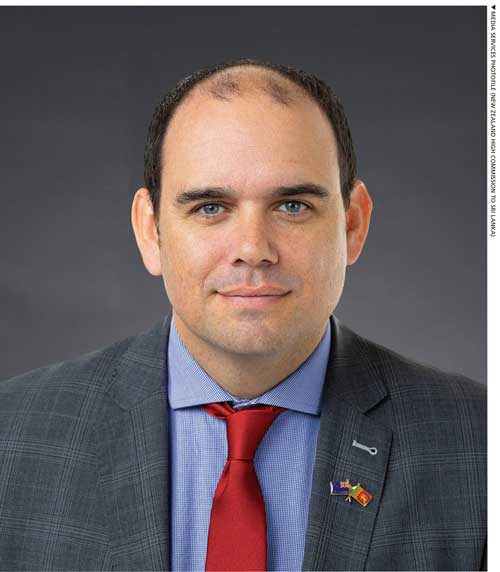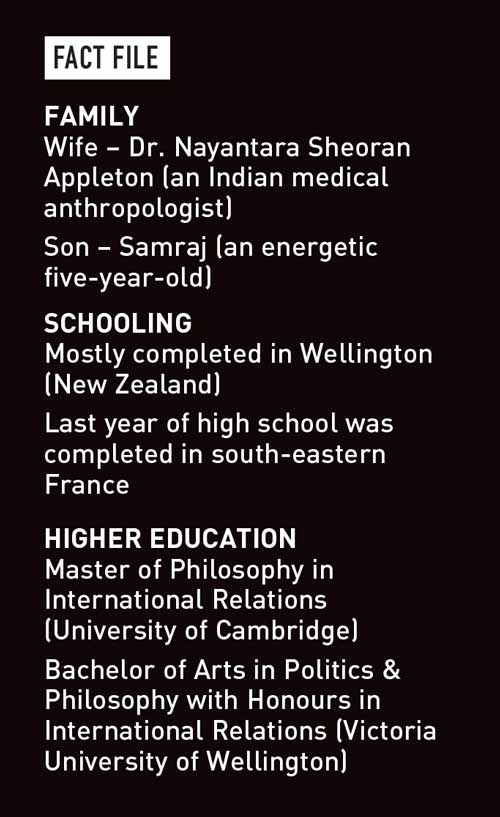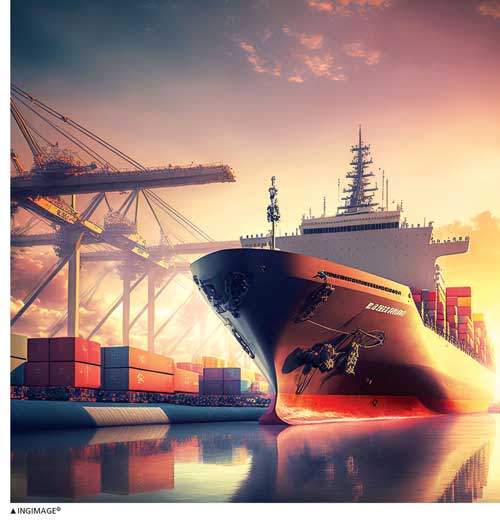NAVIGATING SHARED FUTURES
Michael Appleton – New Zealand’s High Commissioner to Sri Lanka –highlights the need to elevate ties

As New Zealand’s first resident High Commissioner in Sri Lanka, my first two and a half years in Colombo have been unusual; punctuated first by COVID-19 and then the economic crisis.
However, the opening of the High Commission of New Zealand in Sri Lanka in 2021 was a significant milestone in our countries’ almost seven decades long friendship. This provides a welcome opportunity to strengthen our existing people to people, sport, education, and business and trade links.
For many years, New Zealand dairy products to Sri Lanka, and Sri Lankan tea and rubber to New Zealand, have been cornerstones of our bilateral trading relationship. Prior to the economic crisis, this amounted to around half a billion dollars of trade a year – and that’s not an insignificant number.
Nonetheless, there is immense potential for this to grow and expand in more diverse directions. Indeed, Sri Lanka and New Zealand are complementary economies and ample sectors of mutual economic opportunity exist – whether they be in information technology, aviation, tourism, education, healthcare, food and beverage or agri-technology.
Over the course of my time in Colombo, I have often been approached by businesses and entrepreneurs who wish to export or import interesting and relevant products or services to Sri Lanka or the other way to New Zealand. Many of these are in the areas mentioned above.
For New Zealand companies interested in or already doing business in Sri Lanka, the New Zealand Trade and Enterprise (NZTE) – our government’s international business development agency – can and does provide support.
At present, many well-known businesses such as Fonterra, Open Country Dairy and Fisher & Paykel Healthcare are operating here. We hope that this increases over time. And as Sri Lanka continues to recover from the economic crisis, we hope that we’ll be able to recommence visits by New Zealand business missions to Sri Lanka.
On the part of the High Commission of New Zealand, we have recognised that the economic crisis has made amplifying our bilateral trade all the more important and necessary – especially for Sri Lanka’s recovery.
We’ve sought to assist this process by providing New Zealand businesses with regular and up-to-date information on market opportunities; connecting businesses with chambers of commerce, business-export development agencies and the New Zealand-Sri Lanka Business Council in our countries; and where possible, by linking representatives and stakeholders directly – many of whom comprise Sri Lanka’s diaspora, and are among the best and brightest in New Zealand, working in a range of sectors.

Earlier this year, we hosted New Zealand’s Special Agricultural Trade Envoy (SATE) and the Asia New Zealand Foundation (ANZF), which met with a series of businesses, entrepreneurs and government stakeholders, to identify opportunities for cooperation between New Zealand and Sri Lanka.
And later this year, we hope to hold our first trade and economic dialogue at senior government levels in Colombo to help foster long-term economic engagement.
While it has been difficult to see the immense suffering caused by Sri Lanka’s economic crisis, it’s also been humbling to see its people and businesses respond with real strength, resilience and ingenuity. New Zealand too underwent an economic crisis in the mid-1980s and over the past year, we have prioritised exploring new ways of providing niche technical expertise to Sri Lanka.
Indeed, as Sri Lanka grapples with questions around establishing the right frameworks to open up its economy, and enable innovative, transparent and conducive ways of doing business, we believe that New Zealand has relevant lessons to share (New Zealand is recognised as being a global leader in the ease of doing business, for example).
So far, our assistance has been in the form of advice from New Zealand experts who can speak on topics relevant to Sri Lanka’s reform process – including monetary policy, dairy development, and public sector and public financial management.
In the coming years however, as Sri Lanka seeks to adapt, improve and reform in response to the crisis, New Zealand will remain a steady, friendly and independent partner, looking for new ways to cooperate to benefit our two people.
This could be through commerce, education, foreign policy and security or our respective diasporas.

Q: You’re stranded on a deserted island and can only have three items… What would they be?
A: A Kindle with lots of books and magazines, a shortwave radio that can pick up sports coverage and news, and a satellite phone to contact Samraj and Nayan.
Q: If you could invite three famous people, dead or alive, to a dinner party at the high commission, who would they be?
A: Politicians or political activists from before I was born – such as US president Abraham Lincoln, New Zealand suffragist Kate Sheppard and India’s first Prime Minister Jawaharlal Nehru.
Q: You may have had to travel extensively within Sri Lanka… What are some of the memorable locations?
A: Sigiriya, the hill country, Jaffna, Trincomalee, Galle, Yala and Wilpattu National Parks, and Anuradhapura.
Q: You’ve been in Sri Lanka for two years – what is your favourite Sri Lankan dish?
A: Definitely the egg hopper. I could eat an egg hopper every day for the rest of my life!
Q: As a cricket enthusiast, who are your favourite Sri Lankan cricketers – and why?
A: I admire so many – especially the world champion class of 1996. Probably Sanath Jayasuriya and Romesh Kaluwitharana; as a young boy, they changed the way I thought about opening batting in one-day cricket.
Q: If you had the choice of being a national cricketer or diplomat, which would you pick?
A: Definitely a diplomat. I’m proud to represent my country but I know where my strengths lie and they’re not on the cricket field!
Q: The Sri Lankan you admire the most is…?
A: The late Merrill J. Fernando – a person of great warmth, integrity and achievement who helped shape how New Zealanders view Sri Lanka.
